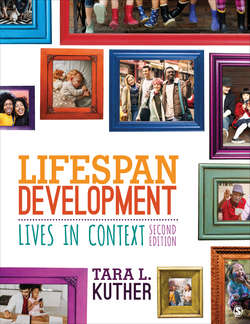Читать книгу Lifespan Development - Tara L. Kuther - Страница 212
На сайте Литреса книга снята с продажи.
Sleep and Brain Development
ОглавлениеWhereas adults sleep approximately 8 hours each day, the typical neonate sleeps about 16 to 18 hours each day. Sleep declines steadily. Six-month-old infants sleep about 12 hours (Figueiredo, Dias, Pinto, & Field, 2016). Infant rats, rabbits, cats, and rhesus monkeys also sleep much longer than adults, suggesting that sleep serves a developmental function (Blumberg, Gall, & Todd, 2014). In adults, sleep is thought to permit the body to repair itself, as indicated by increased cell production and the removal of metabolic wastes during sleep (Tononi & Cirelli, 2014). Sleep is also associated with increases in connections among neurons (Krueger, Frank, Wisor, & Roy, 2016).
One hypothesis for infants’ increased time in sleep is that it provides stimulation and promotes brain development.
iStock/Imagesbybarbara
Sleep is associated with adult memory, improving the consolidation of memory, and sleep deficits are associated deficits in attention, memory, and learning (Chambers, 2017; Doyon, Gabitov, Vahdat, Lungu, & Boutin, 2018; R. M. C. Spencer, Walker, & Stickgold, 2017). REM sleep, rapid eye movement sleep, is thought to be particularly important for cognition. Adults’ eyes flutter and move while in REM sleep, and dreaming occurs during REM sleep (Lewis, 2017). Infants spend about half of their sleep time in REM sleep, decreasing to about 20% in adulthood. Given that dreaming happens in REM, one hypothesis for infants’ increased time in sleep is that it provides stimulation and promotes brain development (Friedrich, Wilhelm, Mölle, Born, & Friederici, 2017). Neonates with poor sleep patterns showed poor attention at 4 months and increased distractibility at 18 months of age (Geva, Yaron, & Kuint, 2016). In another study, infants assessed at 12 months of age and again at 3 to 4 years old showed that lower-quality sleep in infancy was associated with problems with attention and behavioral control in early childhood (Sadeh et al., 2015). Sleep also promotes physical growth and development (Tham, Schneider, & Broekman, 2017).
Sleeping serves a developmental function, yet young infants wake often. The typical newborn wakes every 2 hours to eat, and babies continue to require nighttime feedings until they are 4 or 5 months old. Cultures differ in infant sleep practices. For example, parents in the United States typically look forward to the time when their infant will sleep through the night, viewing the newborn’s unpredictable sleep pattern as something to fix. In contrast, many European parents view newborn sleep as part of normal development and do not intervene to shape newborn sleep cycles. Children in Pacific-Asian countries tend to sleep an hour less than those in North America, Europe, and Australia (Galland, Taylor, Elder, & Herbison, 2012; Mindell, Sadeh, Wiegand, How, & Goh, 2010). Parental behavior influences infants’ sleep patterns. Infants are more likely to continue waking overnight when their parents play with them during nighttime feedings, as stimulation and attention may reinforce nighttime waking (Sadeh et al., 2015). Cultures also have different practices around sleeping arrangements for infants, toddlers, and older children—including co-sleeping and bedsharing (see Cultural Influences on Development).
